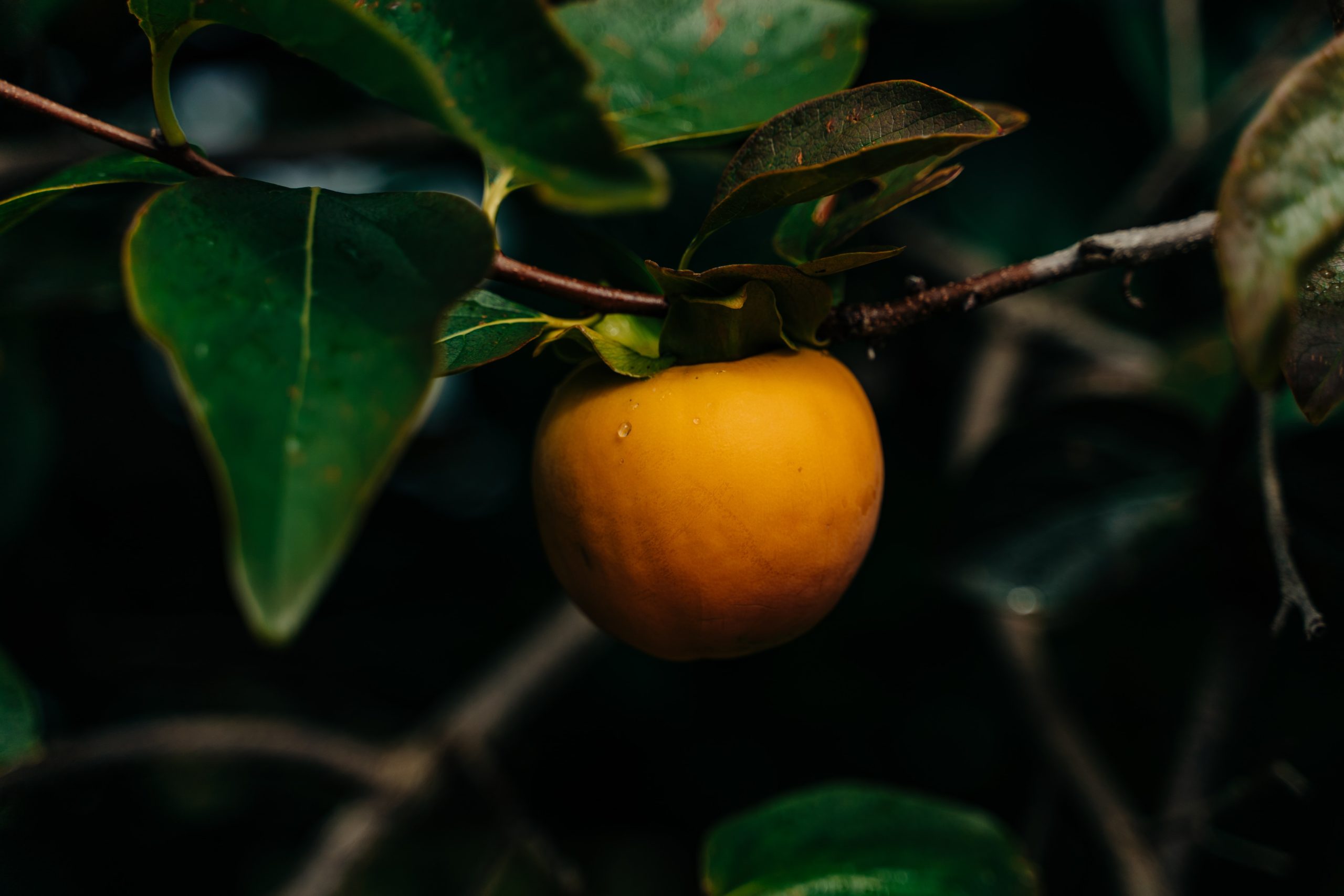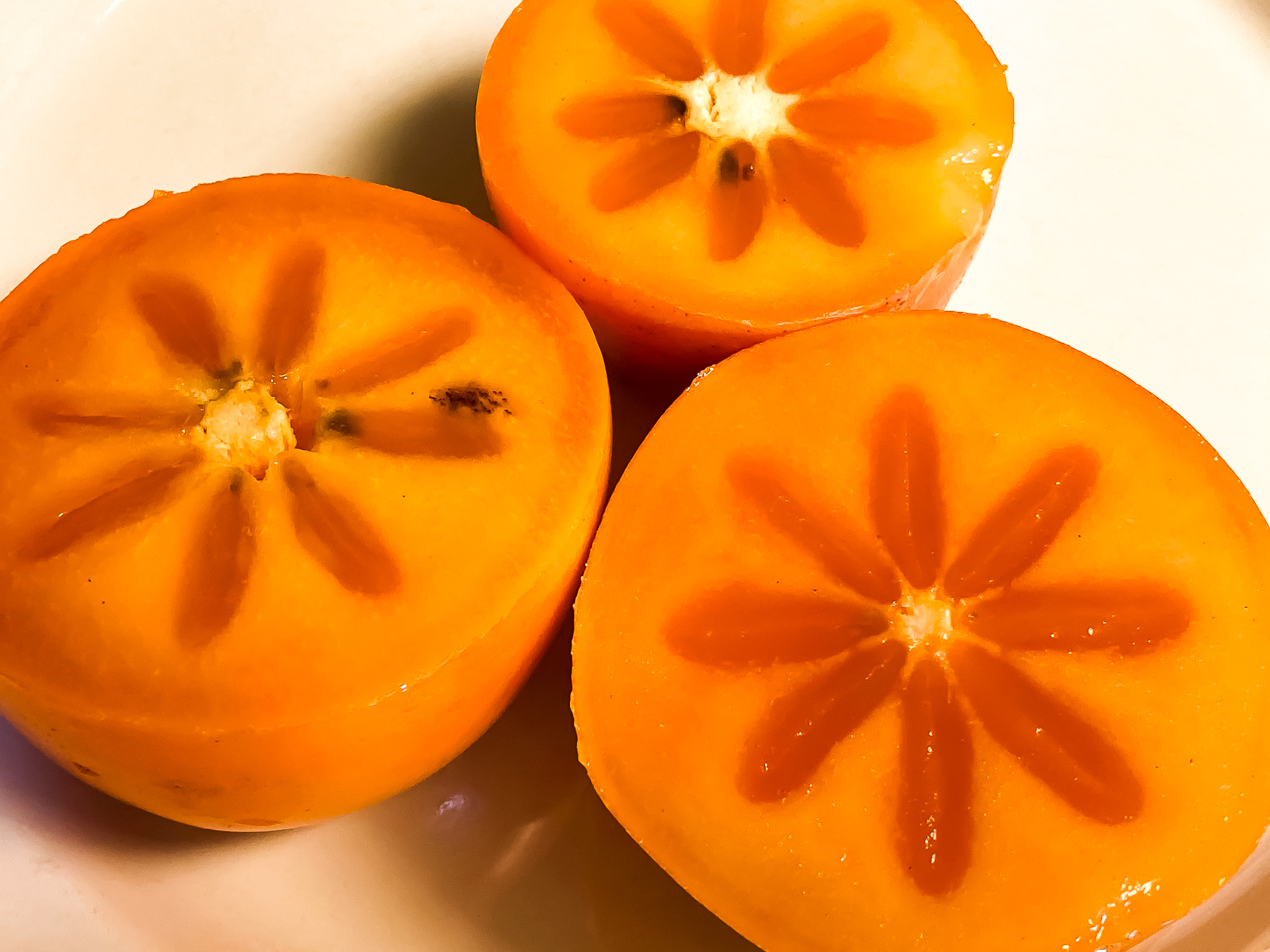“I’m going to check the persimmons!” I cry, seizing our sturdy step-stool on my way out the door. After a long, hard week of work I’m not just hungry for fresh air; I’m eager to harvest (and snack on) my favorite homegrown fruit.
The persimmon tree stands alone between our chicken yard and the woods behind our house. She’s still short and slender; loaded with fruit, she bears a striking resemblance to Charlie Brown’s scrawny little Christmas tree. But don’t let her size and awkward features fool you. Back in mid-October when Hurricane Delta slammed through Louisiana and tore much taller, broader trees up by their roots, she never budged.
Today, thankfully, the weather is calm. The wind is kind, and there’s a delightful chill in the air as I mount the stool and cup my hand around an orange persimmon. These are the acorn-shaped Hachiya type; unlike the apple-like Fuyu variety, Hachiyas must be eaten only when they’re soft and almost overripe. Bite into a slice of firm Hachiya, and the bitter astringency will coat the inside of your mouth and make you gag. Find a soft, sweet one, though, and you’ll understand why their species’ technical name, “Diospyros,” is often poetically rendered as “the fruit of the gods.”
I’m looking for that perfect tenderness as I test one persimmon, then the other. The first one is too hard, so I move on. The second is almost ripe enough, but not quite…and then, Ah-hah! Got one! And another one! And one more—!
But before I can exult over the third fruit, I feel something wet and squishy and jerk my hand back in disgust. Either a bird has gone to work on the persimmon’s soft skin, or hordes of pesky bugs have eaten it from the inside out. Whatever the cause, there’s a gaping, oozing hole. It’s a total loss.
The self-condemnation is as quick as it is vicious: Maybe if I’d been more vigilant, I could’ve saved it.
Instantly, I turn as acrid as an unmellowed Hachiya: What do you mean, “if I’d been more vigilant?!” These past few months I’ve dealt with multiple hurricanes, exhausting work, and daunting deadlines. I’ve barely had the mental energy to meditate and pray throughout the day, let alone remember to check the persimmons. Don’t talk to me about vigilance, O haughty brain-of-mine!
Yet even as I grumble against myself, I know my indignant self-defense is only half-justified. Like the Virgin Mary, who “treasured up all these things and pondered them in her heart,” I am called to watch for the endless examples of God’s extravagant goodness. And since I love connecting the dots between my interior life and my physical reality, of course I’ll apply this posture of vigilance to my persimmon-tending responsibilities.
Why does this feel like such an impossible task, though? Especially right now?
Oh, dear heart, it isn’t impossible, a gentler, far less censorious voice murmurs back. It just needs practice.
I take a deep breath and drag the stool to the other side of the tree. The fruits don’t look nearly as ripe over here. I should probably be content with the two I’ve already picked and call it a day. Nevertheless, I reach up, my fingers closing hopefully around the closest persimmon—
SNAP! To my surprise it comes loose without a struggle. It’s soft and heavy in my palm, its skin a warm, deep color. In other words, it’s absolutely perfect.
I smile as I run my thumb over its plump side. Despite my earlier frustrations, I take the moment to tell myself, deliberately and purposefully, This is a gift, Maribeth. Savor it.
Wonder at it.
My stomach growls as I hurry inside with my pickings. I rinse them, slice off their leafy tops, set them on their sides, and cut them in half. The pieces fall back on the cutting board with a soft, wet thump, baring their hidden treasures for all the world to see.
The Oxford Dictionary defines wonder as “a feeling of surprise mingled with admiration, caused by something beautiful, unexpected, unfamiliar, or inexplicable.”
Having picked persimmons for years, I no longer find their “stars” unexpected or unfamiliar.
Yet as I pull up my phone’s camera to capture their simple symmetry, I’m certain of one thing: they remain as beautiful and inexplicable as ever. God didn’t have to plant a star inside each persimmon He created. But if I may borrow an analogy from G.K. Chesterton, perhaps He is strong and joyful enough to exult in these tiny beauties every single time. When I have boxes full of ripe persimmons, I barely notice the stars in my haste to process and preserve them. It may be, however, that He has never tired of them: “…for we have sinned and grown old, and our Father is younger than we.” [1]
And here lies the answer to my fretful questions about watching, treasuring, and pondering. It is impossible to do? No. But it is a practice, and our wonder-filled Father knows this. There are seasons when our vigilance is dulled or soured by exhaustion, grief, or anger. He understands that, too. He knows that staying wide awake is often as easy as standing your ground in a hurricane.
But the more we practice and the more we trust Him, the more we become like children waiting breathlessly for Christmas morning. It may be that we, too, grow strong enough to see His constancy and His joy in a scrumptious feast, a good night’s rest, a friend’s encouragement, a soaring piece of music, a harvest moon, or a persimmon star. Just as we celebrate the unfolding of Mary’s humble “yes” to God this Advent season, may we, too, find ourselves saying “yes” to the wonders He showers upon us.
[1] Chesterton, G.K. Orthodoxy. Sam Torode Book Arts, 2016
The featured image is courtesy of Gabriella Clare Marino on Unsplash.
We are grateful for her generosity and for her gifted eye!
Maribeth Barber Albritton is an author, wife, mother, and small business owner. She serves as Director of Media and Communications for The Cultivating Project and contributes to the production of Cultivating Magazine’s print editions. She also works as an Executive Assistant at The C.S. Lewis Foundation.
Maribeth has a deep love for history, literature, and film. These keen interests inspired her debut science-fiction novel, Operation Lionhearted, as well as her blog, A Writer’s Tale, where she’s written a number of book and movie reviews from the angle of the Christian imagination.
Maribeth, her pastor-husband Casey, and their daughter Molly live in rural Mississippi in a red-brick manse they’ve affectionately named “Crickhollow.”
Leave a Reply
A Field Guide to Cultivating ~ Essentials to Cultivating a Whole Life, Rooted in Christ, and Flourishing in Fellowship
Enjoy our gift to you as our Welcome to Cultivating! Discover the purpose of The Cultivating Project, and how you might find a "What, you too?" experience here with this fellowship of makers!



Maribeth, I have never tasted a persimmon, but your piece totally took me down memory lane: checking mango trees for the right tenderness, or eyeing the leafy branches of different species for the tell-tale rosy red, golden or even green-skinned orbs that deliver a heavenly elixir too, as reward to the vigilant with practiced eye —who has learned to watch for the wonder!
Thank you so much for your comment, Denise! I’m so glad you enjoyed the piece. I love mangoes, too–although in my case, it’s more about setting an unripe one in the windowsill and watching its skin change from a deep green to those tell-tale rosy colors!